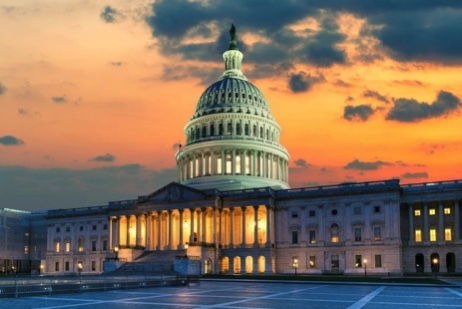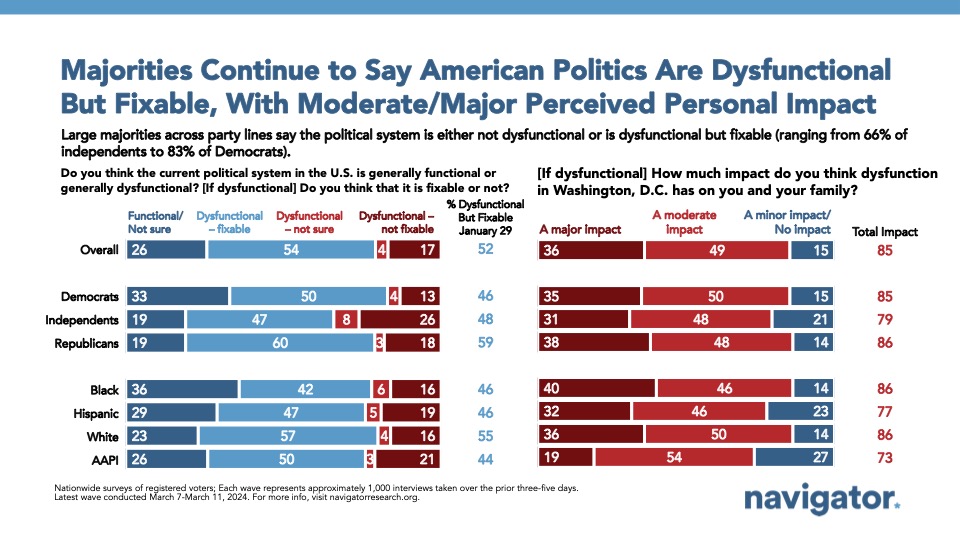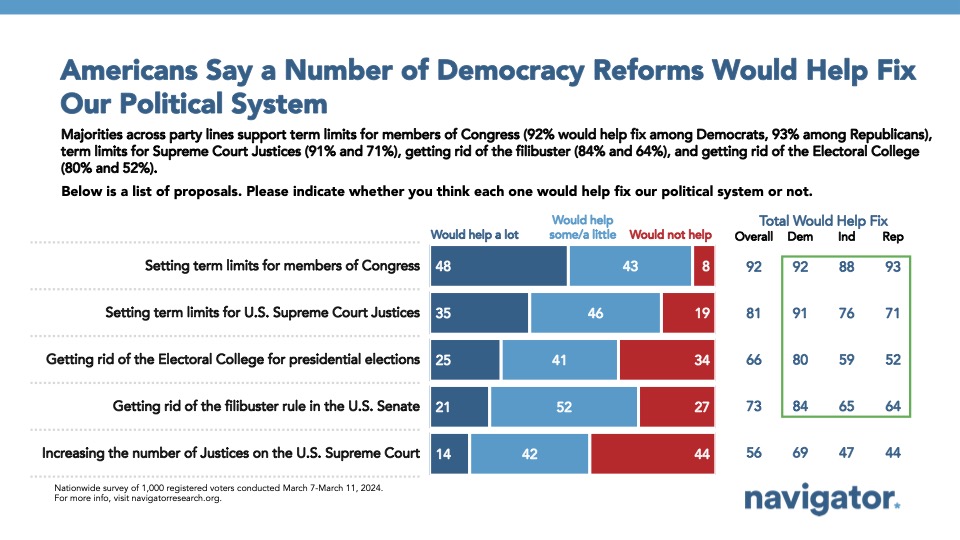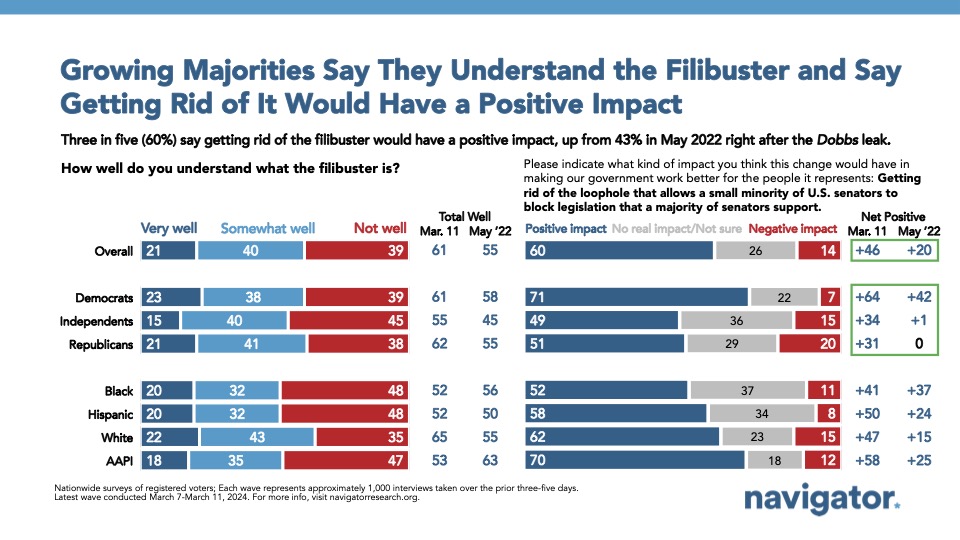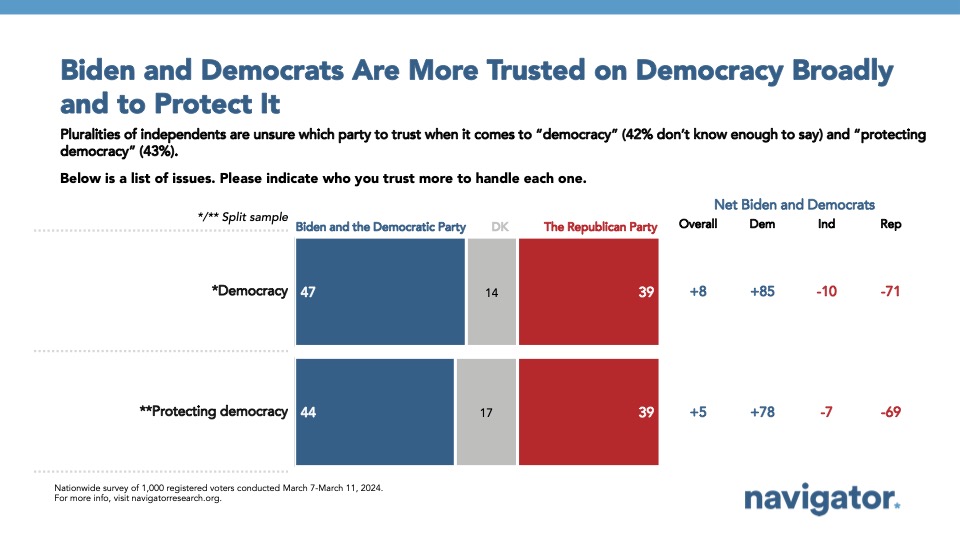Poll: Filibuster & Democracy Reforms
This Navigator Research report contains polling data on how Americans describe the current state of the U.S. political system, which policies Americans feel would help the government work better, and which political party Americans trust more to handle democracy and to protect it.
Majorities of Americans continue to say that our politics are dysfunctional but fixable.
Three in four Americans describe the current U.S. political system as dysfunctional; however, among those who feel the government is dysfunctional, most feel the political system is fixable. While 74 percent of Americans say the U.S. political system is dysfunctional, more than half of Americans believe it is dysfunctional, but fixable (54 percent), including one in five who feel the political system is “very” fixable (20 percent). This share saying the U.S. political system is dysfunctional but fixable is higher among Baby Boomers (57 percent), those living in households making more than $50,000 a year (56 percent), and those who are unfavorable to both President Biden and former President Trump (55 percent).
Majorities across party lines believe a variety of democracy reforms could help fix the U.S. political system.
Among a list of proposals Americans feel would help fix our political system, the most popular include setting term limits, getting rid of the filibuster, and getting rid of the Electoral College. Americans say a number of proposals would help fix our political system, including getting rid of the filibuster rule in the U.S. Senate (73 percent), getting rid of the Electoral College for presidential elections (66 percent), and increasing the number of Justices on the U.S. Supreme Court (56 percent).
Three in five Americans now believe that getting rid of the filibuster would have a positive impact in making our government work better.
When asked to assess the impact of “getting rid of the loophole that allows a small minority of U.S senators to block legislation that a majority of senators support,” three in five Americans believe it would have a positive impact (net +46; 60 percent positive impact – 14 percent negative impact). This is a net 26-point increase from our May 2022 survey immediately after the leaked Dobbs decision (net +20; 43 percent positive impact – 23 percent negative impact). Eliminating the filibuster is supported across partisanship, including among Democrats (net +64; 71 percent positive impact – 7 percent negative impact), independents (net +34; 49 percent positive impact – 15 percent negative impact), and Republicans (net +31; 51 percent positive impact – 20 percent negative impact).
- Three in five Americans say they understand what the filibuster is (61 percent), a 6-point increase from May of 2022 (55 percent), though just one in five say they understand the filibuster “very well” (21 percent). Republicans and Democrats are most likely to say they understand the filibuster (62 percent and 61 percent, respectively) compared to just 55 percent of independents.
Biden and Democrats are more trusted to protect democracy.
More Americans trust President Biden and the Democratic Party on handling democracy and protecting it more than the Republican Party, though a plurality of independents are unsure of which party to trust. By an 8-point margin, more Americans trust the Democratic Party more on handling the issue of democracy (47 percent Biden/Democrats – 39 percent Republicans). However, a plurality are unsure which party to trust more (42 percent) while those who have an opinion narrowly trust the Republican Party more by 10 points (24 percent Biden/Democrats – 34 percent Republicans). The Democratic Party holds double-digit trust advantages among Black Americans (net +53), Asian Americans and Pacific Islanders (net +49), and Hispanic Americans (net +37), while white Americans narrowly trust the Republican Party more (net -6).
- Similarly, Biden and the Democratic Party also hold a narrow trust advantage on “protecting democracy” (net +5; 44 percent Biden/Democrats – 39 percent Republicans), with a plurality of independents unsure which party to trust more (43 percent) while those who have an opinion narrowly trust the Republican Party more by 7 points (25 percent Biden/Democrats – 32 percent Republicans).
